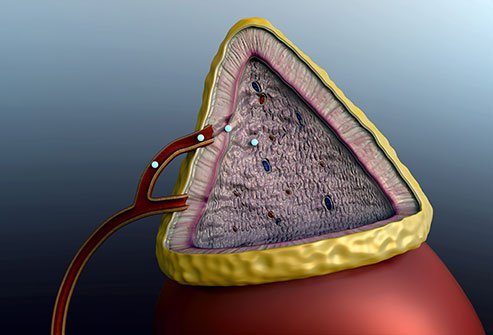Addison’s Disease: How Is It Treated and Can It Be Cured?
What is Addison's disease?

Just above your kidneys, you have two adrenal glands. They’re responsible for producing many of your body’s essential hormones, including cortisol, aldosterone, and adrenaline. Addison’s disease is a condition that happens when your adrenal cortex gets damaged. As a result, the adrenal glands don’t produce enough hormones.
There are two types of Addison’s disease: primary adrenal insufficiency and secondary adrenal insufficiency. The first type occurs as a result of an autoimmune condition in which your immune system attacks your adrenal glands. The glands become so damaged that they can’t make enough hormones anymore. With the second type, your pituitary gland doesn’t make enough adrenocorticotropin (ACTH), a hormone that tells your adrenal glands to make cortisol.
Main symptoms
Several symptoms can indicate Addison’s disease, such as:
- Darkening skin
- Bluish-black coloration around the mouth, nipples, scrotum, or vagina
- Feeling weak, fatigued, or dizzy
- Nausea, vomiting, and diarrhea
- Low blood pressure
- Low blood sugar
- Irritability
Without treatment, you could face an Addisonian crisis, which may have symptoms such as delirium and hallucinations.
Main causes
Many issues can lead to Addison’s disease. Primary adrenal insufficiency may occur as a result of:
Secondary adrenal insufficiency may develop as a result of:
- Long-term use of medications such as prednisone
- Tumors on the pituitary gland
- Radiation treatment of the pituitary gland
- Removal of parts of your hypothalamus
Who can get it
Those most at risk for Addison’s disease are those who have autoimmune conditions such as Graves disease, have cancer, experience chronic infections, or underwent procedures that removed parts of the adrenal glands.
How do you know if you have Addison's disease?
Diagnosing Addison’s disease requires medical evaluation. First, your doctor will review your medical history and go over your symptoms. The next step is blood tests. Your doctor may order such tests as:
- ACTH stimulation test, which monitors your body’s response to ACTH and is the most common test for diagnosing Addison’s disease
- CRH stimulation test, which can test for secondary insufficiency when ACTH testing isn’t clear
- Insulin tolerance test, which can test your pituitary gland’s response to low blood pressure
If your doctor diagnoses you with Addison’s disease, they will run some tests to determine the type of adrenal insufficiency and prescribe you the most effective treatment. These tests might include:
- Antibody tests, which tests for antibodies that show up in your system as a result of autoimmune Addison’s disease
- Computed tomography (CT) scan, which can show changes to your adrenal glands
- Tuberculosis tests
- Magnetic resonance imaging (MRI), which allows your doctor to look for changes in your pituitary gland and hypothalamus
Treatments of Addison's disease
While Addison’s disease isn’t curable, it can be treated, usually with a combination of medication and lifestyle adjustments.
Medications
Treating Addison’s disease involves taking hormones to replace those that your adrenal glands don’t make. Hydrocortisone is the most common corticosteroid for replacing cortisol. If your adrenal glands don’t make enough aldosterone, you may be prescribed fludrocortisone. Your doctor will prescribe a dosage according to your specific needs. These medications are used to manage rather than cure the condition, and they’re typically life-long.
Alternative therapies
Your doctor may also recommend lifestyle changes to help you manage your Addison’s disease. Managing stress is crucial, as is avoiding situations that can cause changes to your blood pressure. Such events can alter your response to your medication.
Complications and side effects of treatments
One complication that can occur as a result of Addison’s disease is an Addisonian crisis. It happens when the condition goes untreated for too long, generally as a result of physical stress. The crisis can lead to low blood pressure, low blood sugar, and too much potassium in your blood. Without immediate treatment, it could be life-threatening. Treating a crisis involves immediate intravenous corticosteroids as well as a salt and sugar solution.
Side effects of medication
In general, side effects of the medications commonly used to treat Addison’s disease are mild. If your doctor prescribes hydrocortisone, you might experience dizziness, weakness, swollen ankles, or headaches. Some other factors can complicate your medication and dosage though, so talk to your doctor to be sure the medication is right for you. There may be times when your doctor has to adjust your medication to account for situations such as a severe injury, illness, or medical procedure.
It’s also important that you take your medications as prescribed by your doctor, and take it at the same time every day. Skipping a dose or taking it late can lead to exhaustion or insomnia. Missing a dose can also increase your risk of having an Addisonian crisis. There isn’t yet a cure for Addison’s disease, but taking your medications as prescribed, at the proper dose, can help you to live a fairly normal, healthy life.
